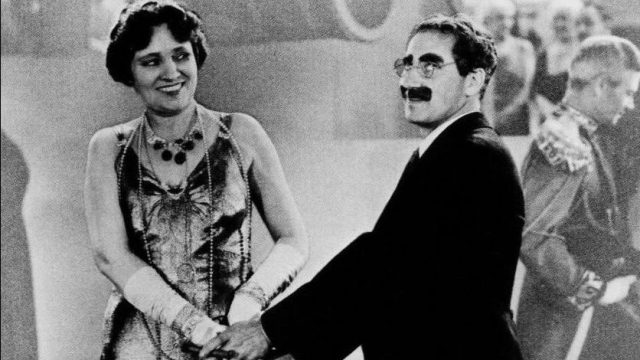“There’s an art to playing straight. You must build up your man, but never top him, never steal the laughs from him.”
— Margaret Dumont, 1942
The Marx brothers insisted that Margaret Dumont didn’t get the jokes.
There are dozens of reasons not to believe this, but the most compelling is probably that the Marx Brothers came up from vaudeville and they were notorious for committing to a bit. Another is that Groucho also called her “practically the fifth Marx Brother.” (There was, in fact, a fifth Marx brother who survived past infancy. Gummo left the act before they starred in any movies. He and Zeppo worked together at a theatrical agency as part of long careers behind the scenes.) There are even recordings of Dumont laughing at some of the jokes in a 1965 recreation of “Hooray for Captain Spaulding.”
But what anyone says offscreen is irrelevant, because what really demonstrates that Dumont is fully in control is right there onscreen.
There’s a legendary story about the sitcom M*A*S*H; when the producers decided that a cast member leaving the show would die offscreen, they didn’t tell the actors in the scene where the death was first announced. Less well-known was that show creator Larry Gelbart said that the takes shot after that surprise were better. The actors, left to do their jobs, could focus on giving the best possible performance. There’s an element of craft to acting that ignorance can rarely duplicate. And Dumont was very, very good at what she did. It takes a lot of smarts to play dumb, and when your co-stars are notorious improvisers, you have to be able to think fast.
Duck Soup is one of the earlier Marx Brothers movies, which meant there were two straight men* to deal with, Dumont and Zeppo (in fact, it would be Zeppo’s last movie with his brothers). A lesser comedy might feel dull with two straight men on board, but Harpo, Groucho, and Chico are so unhinged that they bounce off the straight faces around them like pinballs, ricocheting from one absurd situation to another withthe assured tone of being the only ones in on the joke. (Deadpool has nothing on Rufus T. Firefly.) Dumont brings a steely ferocity to Gloria Teasdale that just asks to be undermined. Poking authority in the eye was what the Marx Brothers did best, and Dumont exudes authority from top to bottom.
In a serious movie, Teasdale would be terrifying, and Dumont has the bearing of a Valkyrie (she trained as an opera singer, maybe that’s why). Her solid commitment to the bit anchors the madness. She was 5′ 8″, a good three inches over the average height of a man her age and taller than every brother but Zeppo. And she is sincere. Firefly cares very little about the fate of his nation; spies Chicolini and Pinky care about getting paid. But Gloria Teasdale believes. She believes in Freedonia, land of the brave and free, and it’s fine with her if the whole world burns down in service of her glorious country. (Like many great comedies, if you push the plot of Duck Soup just half-a-tick in the wrong direction, you could get a great horror movie.)
Like Ginger Rogers, who did all the work Fred Astaire did backward and in high heels, Dumont had all the work of a Marx Brothers film, with the near-impossible burden of keeping a straight face through it all. And through it all she never broke. A rare accomplishment indeed.
* I’m going to use the not-at-all-gender-neutral term “straight man” for the role, because that’s generally how it’s used, but I’m also going to take a moment to note how gendered the role usually is. The “straight woman” is all too often simply the “buzzkill.”

